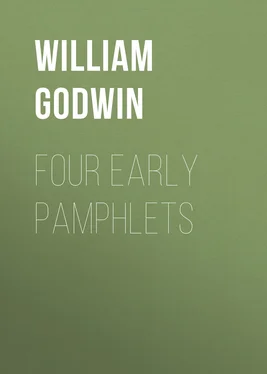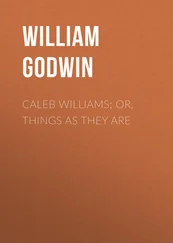William Godwin - Four Early Pamphlets
Здесь есть возможность читать онлайн «William Godwin - Four Early Pamphlets» — ознакомительный отрывок электронной книги совершенно бесплатно, а после прочтения отрывка купить полную версию. В некоторых случаях можно слушать аудио, скачать через торрент в формате fb2 и присутствует краткое содержание. Жанр: foreign_prose, Европейская старинная литература, на английском языке. Описание произведения, (предисловие) а так же отзывы посетителей доступны на портале библиотеки ЛибКат.
- Название:Four Early Pamphlets
- Автор:
- Жанр:
- Год:неизвестен
- ISBN:нет данных
- Рейтинг книги:4 / 5. Голосов: 1
-
Избранное:Добавить в избранное
- Отзывы:
-
Ваша оценка:
- 80
- 1
- 2
- 3
- 4
- 5
Four Early Pamphlets: краткое содержание, описание и аннотация
Предлагаем к чтению аннотацию, описание, краткое содержание или предисловие (зависит от того, что написал сам автор книги «Four Early Pamphlets»). Если вы не нашли необходимую информацию о книге — напишите в комментариях, мы постараемся отыскать её.
Four Early Pamphlets — читать онлайн ознакомительный отрывок
Ниже представлен текст книги, разбитый по страницам. Система сохранения места последней прочитанной страницы, позволяет с удобством читать онлайн бесплатно книгу «Four Early Pamphlets», без необходимости каждый раз заново искать на чём Вы остановились. Поставьте закладку, и сможете в любой момент перейти на страницу, на которой закончили чтение.
Интервал:
Закладка:
The vulgar, incapable of comprehending these exalted passions, are apt upon the slightest occasions to suspect, that this heroical language is only held out to them for a lure, and that the most illustrious characters among us are really governed by passions, equally incident to the meanest of mankind. Let such examine the features and the manners of Mr. Fox. Was that man made for a Jesuit? Is he capable of the dirty, laborious, insidious tricks of a hypocrite? Is there not a certain manliness about him, that disdains to mislead? Are not candour and sincerity, bluntness of manner, and an unstudied air, conspicuous in all he does?—I know not how far the argument may go with others, with me, I confess, it has much weight. I believe a man of sterling genius, incapable of the littlenesses and meannesses, incident to the vulgar courtier. What are the principal characteristics of genius? Are they not large views, infinite conceptions, a certain manliness and intrepidity of thinking? But all real and serious vice originates in selfish views, narrow conceptions, and intellectual cowardice. A man of genius may possibly be thoughtless, dissipated and unstudied; but he cannot avoid being constant, generous, and sincere. The union of first rate abilities with malignity, avarice, and envy, seems to me very nearly as incredible a phenomenon, as a mermaid, a unicorn, or a phoenix.
I cannot overcome the propensity I feel to add Mr. Burke to this illustrious catalogue, though the name of this gentleman leads me out of the circle of the cabinet. Mr. Burke raised himself from an obscure situation, by the greatness of his abilities, and his unrivalled genius. Never was distinction more nobly earned. Of every species of literary composition he is equally a master. He excels alike in the most abstruse metaphysical disquisition, and in the warmest and most spirited painting. His rhetoric is at once ornamented and sublime. His satire is polished and severe. His wit is truly Attic. Luxuriant in the extreme, his allusions are always striking, and always happy. But to enumerate his talents, is to tell but half his praise. The application he has made of them is infinitely more to his honour. He has devoted himself for his country. The driest and most laborious investigations have not deterred him. Among a thousand other articles, that might be mentioned, his system of oeconomical reform must for ever stand forth, alike the monument of his abilities, and his patriotism. His personal character is of the most amiable kind. Humanity and benevolence are strongly painted in his countenance. His transactions with lord Rockingham were in the highest degree honourable to him. And the more they are investigated, and the better they are understood, the more disinterestedness of virtue, and generous singularity of thinking, will be found to have been exhibited on both sides.
It is necessary perhaps, that I should say a word respecting the aristocratical principles of this gentleman, by which he is distinguished from the rest of his party. To these principles I profess myself an enemy. I am sorry they should be entertained by a person, for whom, in every other respect, I feel the highest veneration. But the views of that man must be truly narrow, who will give up the character of another, the moment he differs from him in any of his principles. I am sure Mr. Burke is perfectly sincere in his persuasion. And I hope I have long since learned not to question the integrity of any man, upon account of his tenets, whether in religion or politics, be they what they may. I rejoice however, that this gentleman has connected himself with a set of men, by the rectitude of whose views, I trust, the ill tendency of any such involuntary error will be effectually counteracted. In the mean time this deviation of Mr. Burke from the general principles of his connexion, has given occasion to some to impute aristocratical views to the whole party. The best answer to this, is, that the parliamentary reform was expressly stipulated by lord Rockingham, in his coalition with the earl of Shelburne, as one of the principles, upon which the Administration of March, 1782, was formed.
From what has been said, I consider my first proposition as completely established, that the Rockingham party was the only connexion of men, by which the country could be well served.
I would however just observe one thing by the way. I forsee that my first proposition lies open to a superficial and childish kind of ridicule. But in order to its operation, it is not necessary to say, that the friends of lord Rockingham were persuaded, that the country could not be well served, but by themselves. In reality, this is the proper and philosophical state of it: that each individual of that connexion was persuaded, that the country could not be well served but by his friends. And I trust, it has now appeared, that this was a just and rational persuasion.
The next argument adduced in conformation of my thesis, is, that they were not by themselves of sufficient strength, to support the weight of administration. It is certainly a melancholy consideration, that there should not be virtue enough left in a people to support an administration of honest views and uniform principles, against all the cabals of faction. This however, is incontrovertibly the case with Britain. The bulk of her inhabitants are become, in a very high degree, inattentive, and indifferent to the conduct of her political affairs. This has been, at one time, ascribed to their despair of the commonwealth, and their mortification in perceiving a certain course of mal-administration persisted in, in defiance of the known sense of the country. At another time, it has been imputed to their experience of the hollowness of all our public pretenders to patriotism. I am afraid, the cause is to be sought in something, more uniform in it's operation, and less honourable to the lower ranks of society, than either of these. In a word, luxury and dissipation have every where loosened the bands of political union. The interest of the public has been forgotten by all men; and we have been taught to laugh at the principles, by which the patriots of former ages were induced, to sacrifice their fortunes and their lives for the welfare of their citizens. Provided the cup of enjoyment be not dashed from our own lips, and the pillow of sloth torn away from our own heads, we do not ask, what shall be the fate of our liberties, our posterity, and our country. Disinterested affection seems to have taken up her last refuge in a few choice spirits, and elevated minds, who appear among us, like the inhabitants of another world. In the mean time, while the lower people have been careful for none of these things , they have been almost constantly decided in the senate, not by a view to their intrinsic merits, but in conformity to the jarring interests, and the inexplicable cabals of faction. In such a situation, alas! what can unprotected virtue do? Destitute of all that comeliness that allures; stripped of that influence that gives weight and consideration; and unskilled in the acts of intrigue?
In conformity to these ideas, when the choice of an administration was once again thrown back upon the people, in March, 1782, we perceive, that no one party found themselves sufficiently strong for the support of government; and a coalition became necessary between the Rockingham connexion, and a person they never cordially approved, the earl of Shelburne. Even thus supported, and called to the helm, with perhaps as much popularity, as any administration ever enjoyed, they did not carry their measure in parliament without difficulty. The inconsiderate and interested did even think proper to ridicule their imbecility; particularly in the house of lords. The most unsuspected of all our patriots, Mr. Burke, was reduced to the necessity of so far contracting his system of reform upon this account, as to have afforded a handle to superficial raillery and abuse.
Читать дальшеИнтервал:
Закладка:
Похожие книги на «Four Early Pamphlets»
Представляем Вашему вниманию похожие книги на «Four Early Pamphlets» списком для выбора. Мы отобрали схожую по названию и смыслу литературу в надежде предоставить читателям больше вариантов отыскать новые, интересные, ещё непрочитанные произведения.
Обсуждение, отзывы о книге «Four Early Pamphlets» и просто собственные мнения читателей. Оставьте ваши комментарии, напишите, что Вы думаете о произведении, его смысле или главных героях. Укажите что конкретно понравилось, а что нет, и почему Вы так считаете.












